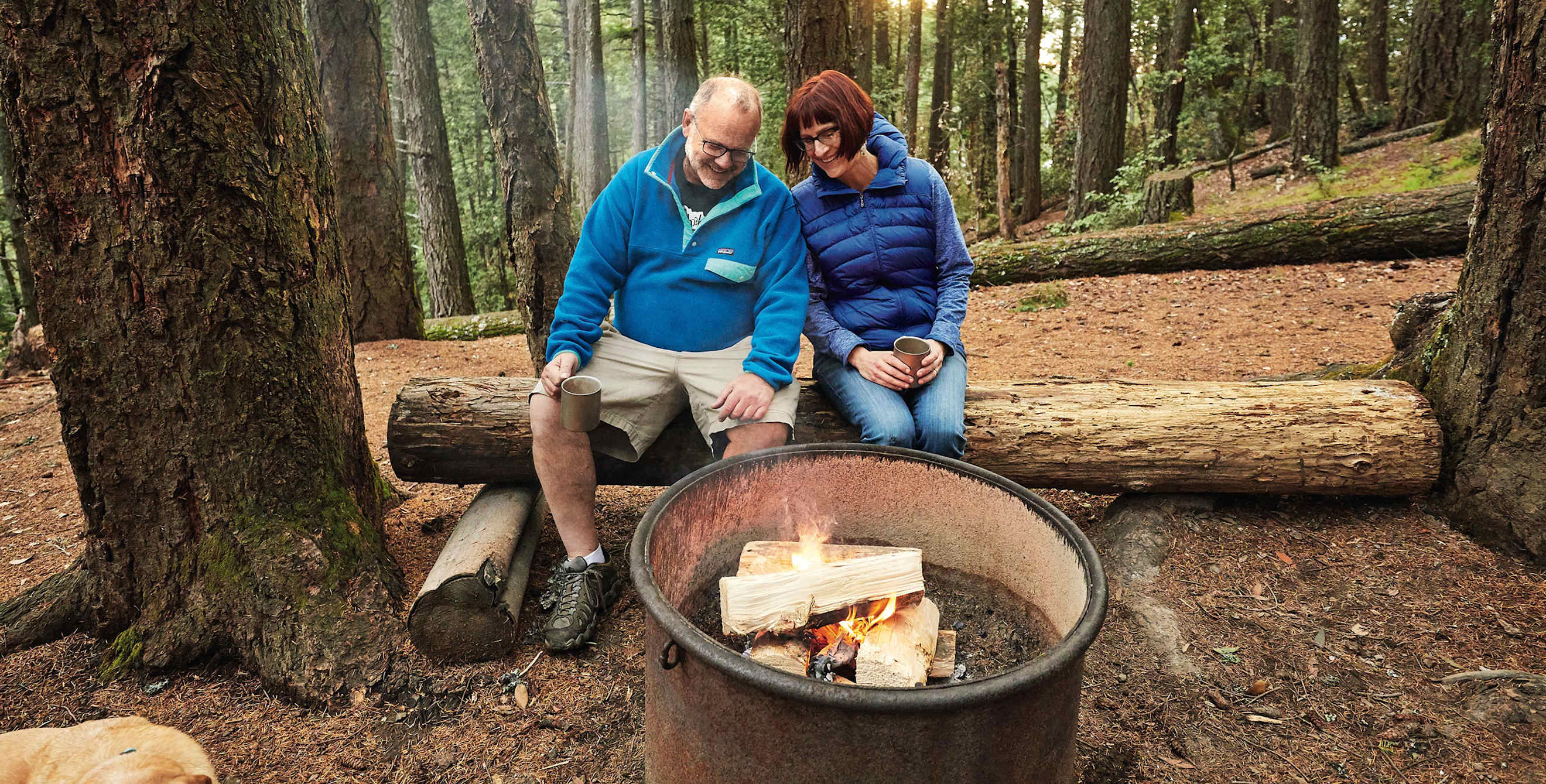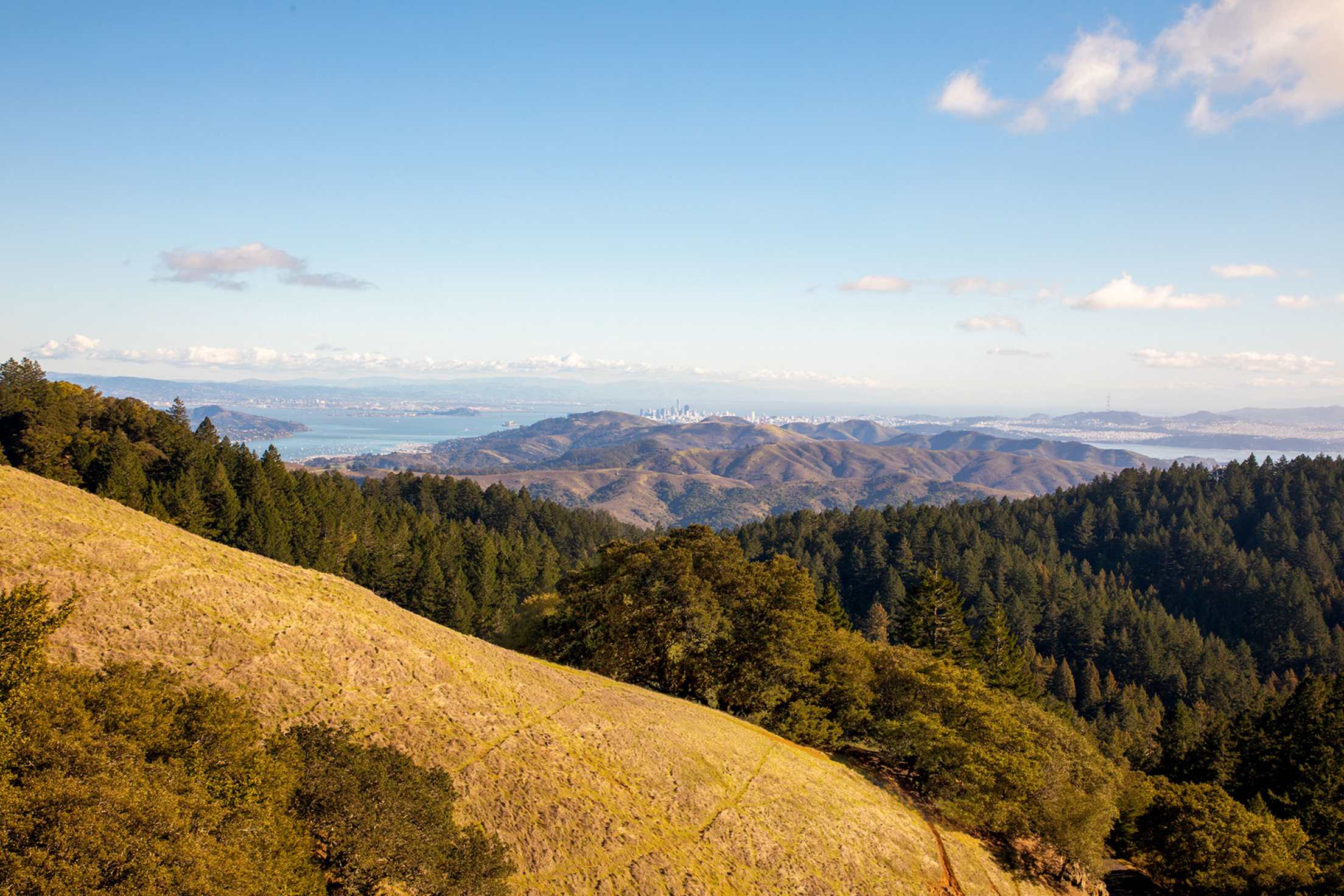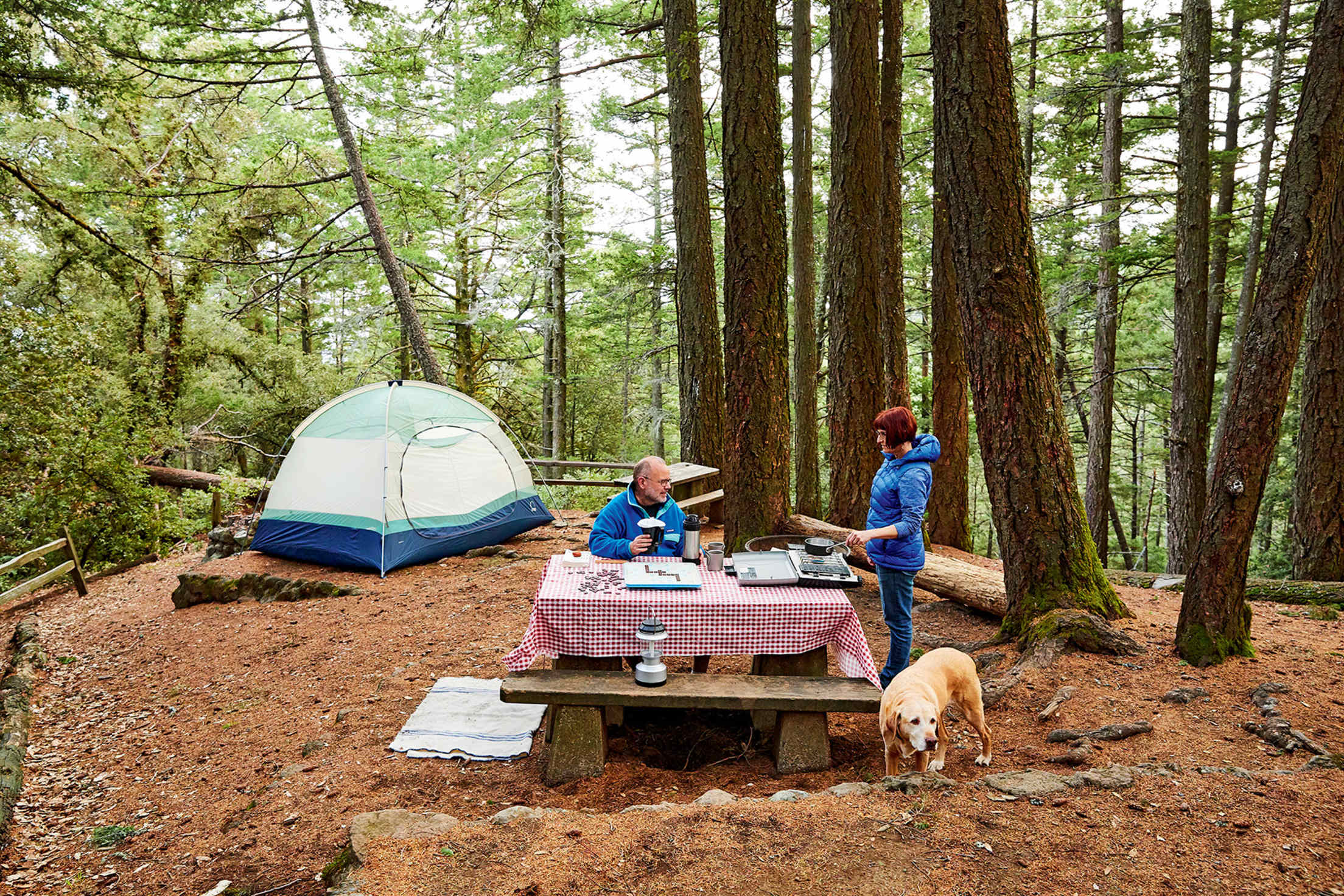
Learning How to Love Camping
Can a camping-crazy husband convince his spouse that the outdoors is made to be loved, not feared?

Dusk in the California redwoods. Stately trees silhouetted against a sky dimming from pink to velvet blue to starry black. A ribbon of smoke curling from a campfire. If you wanted to title this scene, you might call it Mountain Serenity or Evening Beauty.
"Why is it getting so dark?" my wife asks. "Is it always this dark?"
Mood broken. We—me, my wife Nancy, and our dog Maisie—are overnighting at Pantoll Campground on Mount Tamalpais, just across the bridge from San Francisco. We're on a weekend getaway that's also an experiment fraught with marital peril. I am trying to convince Nancy to love something that I love and she does not: camping.
So far, the results are... mixed.
"The worst of it is," Nancy had said as we drove up Mount Tam earlier that day, "I feel I'm betraying my heritage."
That's the irony. Nancy comes from generations of campers. Her ancestors drove covered wagons on the Oregon Trail. Her grandparents first met on the snowcapped summit of Mount Baker in Washington. Nancy's childhood was filled with pile-the-kids-and-their-sleeping-bags-in-the-station wagon camping trips to America's scenic wonders.
The rest of her family loved those vacations. Not Nancy. "When we went hiking, my sister would poke me with a stick because I didn't walk fast enough," she recalled. Then there was the middle-of-the-night encounter with the bear. Bears! Sharp sticks! They led Nancy to abandon the tent for the Pilates studio.
Me? I fell hard for the great outdoors during my first Boy Scout Camporee, and I've never looked back. Sleeping under the stars, I've experienced things I'll never forget. Watching the Perseid meteor shower from Nevada's Great Basin National Park. Seeing an actual moose—an animal previously known to me only from Rocky and Bullwinkle cartoons— amble through a campground in Utah's Wasatch mountains. I'm not an expert camper, but I am an enthusiastic one. And isn't part of marriage sharing enthusiasms with your beloved?
It was early afternoon when we reached Pantoll Campground. We installed ourselves and our stuff in site No. 10, a pine needle–carpeted space perched on a small hillside with views into the surrounding redwoods. We were only 10 miles from the city, but as we took in the scene—the thicket of trees, the mist-softened air, the occasional bird chirrups—we felt as though we had entered a different world.

I had chosen Pantoll, and Mount Tam, carefully. While I love the solitude of backpacking, I didn't think lugging our gear on our backs to a remote site would appeal to Nancy. She might enjoy glamping (the luxe tents, the wine tastings), but at several hundred dollars a night, it was beyond our budget. I decided we would go with the classic compromise: car camping. We would be able to carry all of our gear in the car and park fairly close to our site, and the reservation shouldn't run more than $25. Also, of vital importance to Nancy, we would have access to an actual bathroom with a flush toilet.
I also wanted to make sure that, since we were taking the trouble to camp, we were sleeping someplace spectacular. That's why I had chosen Mount Tam. The peak rises above the glittering San Francisco Bay like an enchanted realm in a fairy tale. As artist Tom Killion wrote, "Tamalpais beckons with the mystery and delight that high places evoke."
The other reason that Mount Tamalpais State Park appealed was that it allows dogs in the campgrounds, and we wanted to bring Maisie, our sweet yellow lab, on the trip. Maisie had joined us from a rescue organization a few months before. As a city dog, her outdoor experiences had been limited to Golden Gate Park and Ocean Beach. How, I wondered, would she react to semiwilderness?
She took to it right away. The moment we hit the nearby Cataract Trail, Maisie was sniffing, wagging. Nancy and I followed, buoyed by dog enthusiasm. It was hard not to be in a good mood. The path married classic Northern California beauty—sculpted hills, gnarled live oaks—with Cataract Falls, where silver water cascaded over dark, mossy rocks.
By lunchtime, Nancy had been won over: An exercise fanatic, she had realized that a good hike was as healthy as an hour-long aerobics class, but with better scenery. "This is lovely," she said, as we ate sandwiches and listened to the splashing falls. "I like hiking."
I was making two camping converts. Victory was near.

The triumph was short-lived, however. By the time we got back to Pantoll, it was late afternoon. In camping time that meant I needed to start dinner, since it's vastly easier to cook before the sun goes down. To impress Nancy, I had gone all out with the menu. Appetizers! (Crackers and cheese.) Camp cocktails! (Regular gin and tonics, but made in a campground.) My award-winning chili!
As I chopped and sliced and stirred, Nancy sat at the picnic table knitting. Once dinner was ready, we ate, drank, and talked. But then daylight faded, the night grew cold, and Nancy grew wary. She put away her knitting: always a bad sign. As a decades-long city dweller, I was disconcerted by the pitch black too. I worried that I would blindly trip over an unseen tree root and break my leg.
I turned on our lantern. I brought out the Scrabble board.
I suggested that we play using camping words. TENT. TREE.
"Can I play HELP ME?" Nancy asked.
She began to recall unhappy memories from camping trips past. "I was always afraid something would go wrong," she said. "It usually did." That bear, for example, surprising her as she walked from bathroom to tent in the middle of the night. "It was giant. I didn't know what to do. It hadn't even occurred to me I needed to worry about bears."
I assured her there probably weren't bears on Mount Tam. At least not many. "Not many?" she said. "How about none?"
We went to bed earlier than planned. We weren't uncomfortable—we had brought sleeping pads to buffer us from the hard ground and down bags to insulate us from the night's chill. Still, only Maisie drifted off happy, eyes closed and tongue out, dreaming of new things to sniff. Nancy, I suspected, was just worrying about bears.
I couldn't sleep either. I stepped outside. Rain was forecast for morning, but now the night spread dazzlingly clear. Above dark treetops shone a million stars. This, I thought, was why I liked camping. You might have beautiful skies at home, but you were too distracted by your life to notice them. Here, in the solitude of a mountain night, you could.
I wished I could share this revelation with my wife, but I didn't think it would do much good. I also realized something else. There's no rule that says the person you love has to love all the same things you do. The thought seemed reasonable, but it made me sad.
I awoke early the next morning and started preparing breakfast. Another meal meant to impress: French press coffee; an omelet involving basil, cherry tomatoes, and two kinds of cheese. The rain had held off. The sunrise sky rippled with salmon-colored clouds.
The coffee was ready. I walked over to the tent, handed Nancy a cup, and went back to cooking.
I was finishing the omelet when I heard her call, "I have a new thought about camping."
"What?" I called back.
"I have to think of it as an adventure," she said. "Something I don't usually do that I'm doing. I don't want to be a person who never tries anything new."
The omelet was done. I brought it to Nancy, Maisie following me in hopes that food might spill.
Then Nancy said, "This isn't so bad. I'm warm, I have my coffee and eggs, and I'm looking out at the trees. They're pretty."
What had changed her mind? The coffee? The omelet? The morning sun turning the redwoods a luminous copper red? Maybe it is true that the best things about camping—the beauty you encounter, the sense of leaving your ordinary life to see the world in a new light—are enough to make converts of even the most skeptical.
All I knew was that somehow things had worked out. Time, I thought, to plan our next trip.